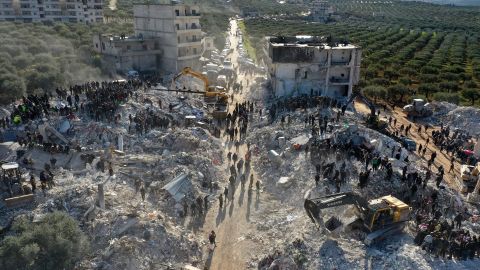Death toll in Turkish-Syrian earthquake rises above 16,000
Freezing temperatures deepened the misery Thursday for survivors of a massive earthquake in Turkey and Syria that killed over 16,000 people, as rescuers raced to save countless people still trapped under rubble.
The death toll from Monday’s 7.8-magnitude quake is expected to rise sharply as rescue efforts pass the 72-hour mark that disaster experts consider the most likely period to save lives.
Turkish President Recep Tayyip Erdogan on Wednesday conceded “shortcomings” after criticism of his government’s response to the earthquake, one of the deadliest this century.
Survivors have been left to scramble for food and shelter and in some cases watch helplessly as their relatives called for rescue, and eventually went silent under the debris.
As criticism mounted online, Erdogan visited one of the hardest-hit spots, the quake’s epicentre Kahramanmaras, and acknowledged problems in the response.
Turkish officials had held talks with Twitter leaders after which deputy infrastructure minister Omer Fatih Sayan tweeted Thursday that Turkey expected the social network to cooperate more in the “fight against disinformation”.
Temperatures plunged to minus-five degrees Celsius (23 degrees Fahrenheit) in Gaziantep early Thursday, but the cold did not stop thousands of families from spending the night in cars and makeshift tents, too scared to stay in their homes or prohibited from returning to them.
Parents walked the streets of the southeastern Turkish city close to the epicentre of the earthquake carrying their children in blankets because it was warmer than sitting in a tent.
Officials and medics said 12,873 people had died in Turkey and at least 3,162 in neighbouring Syria from Monday’s quake, bringing the total to 16,035. Experts fear the number will continue to rise sharply.
However, Brussels, the EU is planning a donor conference in March to mobilise international aid for Syria and Turkey.
Dozens of nations, including the United States, China and the Gulf States have pledged to help, and search teams as well as relief supplies have already arrived.
The EU was swift to dispatch rescue teams to Turkey, but it initially offered only minimal assistance to Syria because of EU sanctions imposed since 2011 on Assad’s government over its brutal crackdown on protesters that spiralled into a civil war.
The Turkey-Syria border is one of the world’s most active earthquake zones.
Monday’s quake was the largest Turkey has seen since 1939, when 33,000 people died in the eastern Erzincan province.
In 1999, a 7.4-magnitude earthquake killed more than 17,000.


